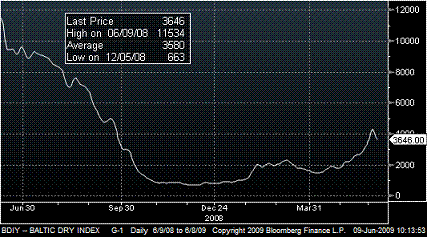THE BDI, at 3646 as at yesterday (8 Jun), is up fourfold since Jan this year but Khalid Hashim, MD of one of the world's largest operators of small handy-sized dry bulk tramp ships, Precious Shipping, warns “the fundamentals still overwhelmingly point to a world economic recession.”
We reproduce here his email on the Baltic Dry Index (BDI) which is being circulated around the investment community:
The rise in the BDI has taken everyone by complete surprise. But in reality the reason for the rise is rather simple.
China binge buying Iron Ore against all expectations with imports rising at 27+ pct higher in 2009 than for 2008, based on the annualized results of the first 4 months of this year, shows you where the big move from the Demand side has come from.
This rise in Iron Ore imports is despite the fact that Steel production in China in the first four months of 2009 has been roughly at the same levels as we had seen in 2008.
An explanation for this increased Iron Ore imports could be from the fact that domestically produced Iron Ore in China is of a rather poor quality and quite expensive when compared to spot imported prices.
Another explanation could be that of speculators getting into the import market to try and get hold of 'cheap' Iron Ore that would possibly be required under the Chinese Governments USD 586 Billion stimulus plan.
And a third could be the impending conclusion of the Iron Ore Contract Price negotiations.
Obviously, when you binge buy and compress imports of a single commodity, carried mainly by Cape size ships, into a very short space in time, you tend to create two issues at the same time.
Firstly, you tend to push up freight rates due to the time-compressed/explosive demand growth for that ship-sector.
And more significantly, you create queues at loading and discharging ports, which tend to reduce availability of spot ships driving prices even higher.
Combine this with delayed delivery schedules of dry bulk ships during Q4 08 and Q1 09 and you have the ingredients of a perfect storm especially when you take the number of Cape size ships that have been sent to the scrap-yard during the last 6/9 months.
The change in the average Time Charter (t/c) rate or earnings per day per ship in the different size categories is instructive.

Compare these numbers with what was prevailing on the 5th December 2008 when the BDI hit a two and half decade low of 663 points, then Capes were earning a paltry time charter rate of USD 2,763 per day per ship, the Panamaxes were at 4,058, Supramaxes at 5,726, and the Handies at 4,352.
Clearly the BDI is more reflective of the Capes and the Panamaxes, as the Panamaxes are a shadow of the Capes, than of the market as a whole.
Besides this sudden, sharp and unexpected rise in the market will have two very bad consequences. Firstly, scrapping will come to a grinding halt. This will stop the squeeze on the supply side, which was originating from the permanent removal of ships via the scrap-yards.
Secondly, with the new 'confidence' in the market, all the delayed deliveries of new ships from the builders might make a startling reversal and lots of new ships could suddenly start appearing on the market.
Both these consequences will result in long term damage to our market and eventual balance between demand and supply will be pushed further away on the time horizon.
In our opinion, based on the congestion at Chinese discharge ports and the present increased level of Iron Ore imports the index could actually cross 5,000 points. We think that congestion should clear up once this binge buying of Iron Ore abates or more new Capes are delivered from the shipyards than the demand can absorb.
Once one or both of these events take place, congestion will vanish very quickly with the BDI crashing down as quickly as it has advanced.
The fundamentals still overwhelmingly point to a world economic recession with tremendous job losses and we suspect that will put a real dampener on the current burning hot BDI.
We hope this helps explain the current situation / movements of the BDI.
Regards
Khalid Hashim
Related story: SHIPPING: China’s anemic iron ore demand rocking the boat




